
views
What does Ceres represent in astrology?

Ceres symbolizes fertility, feminine energy, and how you nurture yourself. Your Ceres placement describes how you care for and protect yourself physically (through things like food and activities) and spiritually (through your relationships or family). It has strong connections to motherhood and caregiving, and those with strong Ceres placements are attentive and loving. The asteroid is named after the Roman goddess Ceres who oversaw agriculture, the harvest, and motherly relationships. Ceres’ energy is simple and understated compared to that of the planets. Caregiving, teaching, cooking, gardening, farming, and the environment are all associated with Ceres. There is debate about which zodiac sign Ceres rules. Many astrologers agree it co-rules Taurus and the Second House, while others argue that it co-rules Virgo or Cancer. Glyph: A sickle placed over a cross. Symbol: A sheaf of wheat or a torch.
Ceres Themes and Influences

Caregiving and nurturing Ceres’ energy reflects things that are simple, natural, and good for your body and spirit. As the goddess of agriculture, Ceres valued nourishment, growth, and the value of all living things. As a result, your Ceres placement shows how you care for yourself and how you nurture and show compassion to others, too. For example, having Ceres in a practical, sensual earth sign might mean you show care and affection through food, physical comfort, pragmatic help with something.

Motherhood and strong feminine figures In your natal chart, Ceres influences your potential parental abilities (especially for female-identifying individuals) as well as your connection to your own mother or caregivers. It might also illuminate your relationships with other prominent feminine figures and women in your life.

Grief and separation In Roman mythology, Ceres lets fertile land go barren as she mourns her daughter, Proserpina, being abducted into the Underworld. So, your Ceres placement may also reveal how you express grief or cope with being separated from loved ones.

Your relationship to the physical world Ceres governs the changing of the seasons and your relationship to the natural environment, including all plants and animals. This includes things like gardening and farming, food security, your respect for nature, and living in harmony with your surroundings.
Ceres in the 12 Zodiac Signs
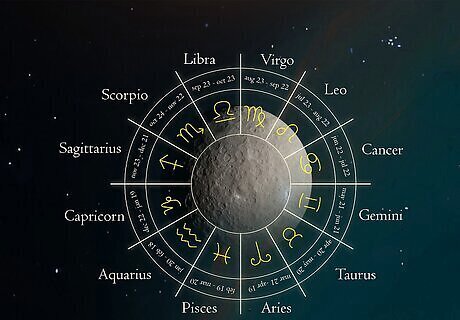
Your Ceres sign reveals how you nurture and care for yourself. It takes Ceres about 4 years to orbit the Sun, meaning it spends about 4 months in each zodiac sign. Your placement shows how you can best grow, adapt, and replenish yourself to be successful: Aries: Physical activities, like sports or exercise, make you feel self-actualized. Independence and competition are important to you. Taurus: Earthly pleasures like food, physical touch, and bodily comfort through the senses revitalize you. A comfortable home environment is a must. Gemini: Scratching your curiosity by reading, watching documentaries, taking classes, or communicating with others satisfies you. Learning is very important overall. Cancer: Tending to your home and loved ones through cooking, providing comfort, and “mothering” others satisfies you. Your fulfillment is found in your family. Leo: You feel seen and nourished through attention, recognition, and appreciation. Creativity and self-expression are must-haves to grow and experience joy. Virgo: Staying organized, self-disciplined, and successful makes you feel nurtured. Achievement and excellence are what drives you. Libra: Beauty, art, and design inspire you to practice self-care. Things like social graces, balance, and fairness make you feel at ease. Scorpio: You need deep, intimate relationships to feel nourished and protected. Exploring profound psychological or emotional interests leads to self-empowerment. Sagittarius: Exploration, travel, philosophy, and adventure pique your interest and make you feel centered. The freedom to expand is necessary for a balanced, happy life. Capricorn: You feel secure and cared for in a stable environment with a clear sense of direction and responsibility. Success and discipline are important to you. Aquarius: Individuality, originality, and choosing your own path in life revitalizes you. Starting something new and using your unique talents for good are important. Pisces: You feel replenished when you’re in the moment, like when you’re listening to music or meditating. Compassion, service, and unconditional love make you feel safe.
Ceres in the 12 Houses
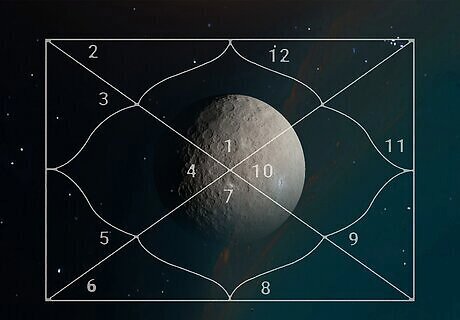
Your Ceres house shows what area of life your nurturing nature appears in. The house is especially important when it comes to understanding your relationship with your parents and how you prefer to be a parent yourself. Your Ceres house speaks to how you can be loving, strong, and helpful to yourself or those you care about: 1st house: Your caregiving instincts are a core part of your identity. You’re grounded and others often come to you for help (just remember to help yourself, too). 2nd house: You may need a caregiver to feel safe and comfortable, and you care for others by making them feel at ease. You may value financial stability and an abundant home. 3rd house: You crave nurturing on an intellectual or mental level. Communicating and being heard are how you feel replenished, and you offer comfort to others in the same way. 4th house: You feel most secure at home in the company of your family or loved ones and may have a strong relationship with your parents. You care for others by “mothering” them. 5th house: You find comfort and security in creativity, self-expression, and fun. You keep others in good spirits with your lighthearted, extroverted energy. 6th house: You find comfort in familiar routines and getting help with the small things, and you nurture others by offering practical help in their daily lives. You may work in a field related to helping others. 7th house: You find replenishment in close relationships and activities with a partner, and you enjoy taking care of each other mutually. You might get this satisfaction in a private, intimate relationship, or in the public eye. 8th house: You crave deep intimacy and a strong connection in order to feel revitalized and seen. You may have crises now and then that lead to self-transformation. 9th house: Exploration helps you grow and connect to others. Travel, new ideas, and unfamiliar points of view help you connect with your higher self and feel alive. 10th house: You’re a natural nurturer and may be a parent or work in a field where you take care of others. You may have a strong relationship with your parents. 11th house: Self-care can come to you in many different and often unexpected ways. You may find the most fulfillment in humanitarian or volunteer work. 12th house: You might feel that some nurturing was or has been missing from your life, and you may have a tendency to self-sacrifice too much. You may need others to guide you to learn how to take care of yourself.
Finding & Interpreting Your Ceres Placement
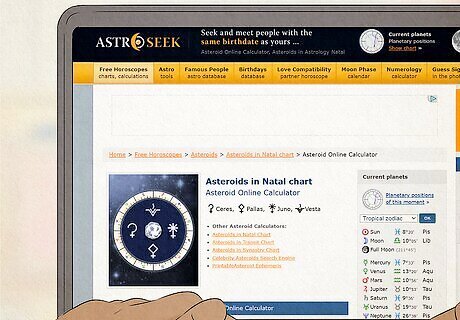
Enter your birth info into a natal chart generator to find your Ceres. You’ll need to know your date and exact time of birth, as well as the name of the town or location where you were born. Plug in your information to view your birth chart. Not all sites will include asteroids, so look for “extended” charts or other advanced options. Try using Astro Seek’s Asteroid Calculator, which lets you select which asteroids you want to view in your chart.
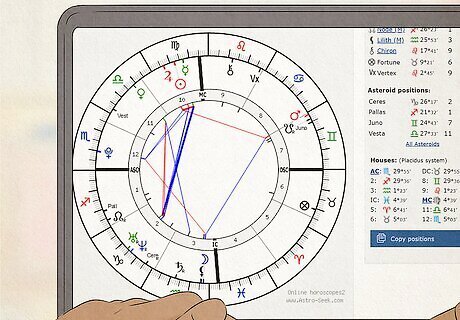
Note the house and zodiac sign placement of your Ceres. The house that Ceres appears in reveals which aspect of your life the asteroid’s nurturing qualities might appear. The zodiac sign indicates how you nurture and protect both yourself and your loved ones. For example: Say your Ceres is in Gemini in the fifth house (the house of self-expression and pleasure). Your self-nurturing may manifest through Gemini’s talkative, communicative nature, especially in creative or fun areas of your life that allow you to express yourself.
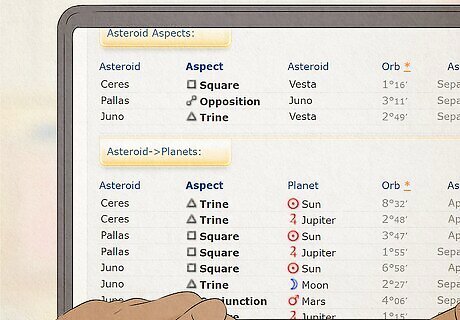
Look for favorable aspects to your Sun, Moon, or Ascendant signs. In astrology, aspects are the angles the planets form with each other that influence how their energies interact. If Ceres is at a favorable angle to your Sun, Moon, or Ascendant (Rising) sign—your 3 most prominent placements—then its influence is more noticeable in your life. Favorable aspects include: A conjunction: This is when Ceres is in the same sign as another planet. For example, having both Ceres and the Moon in Taurus. A sextile: This is when 2 planets are about 60 degrees apart and in compatible elements, like fire and air or earth and water (for example, Ceres in Gemini and the Sun in Leo). A trine: This is a very lucky angle (about 120 degrees) that puts 2 planets in signs of the same element (like Ceres in Capricorn and your Ascendant in Taurus). Having Ceres outside these favorable angles doesn’t mean you’re not caring or nurturing. It just means those traits may not be as dominant or obvious. Remember that Ceres is only one celestial body out of many in your chart. Other planet and asteroid placements can impact your nurturing qualities, too.
The Myth of Ceres & Proserpina
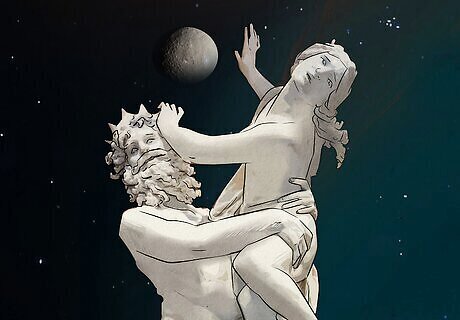
The tale of Ceres and her daughter Proserpina explains the changing seasons. As goddess of the harvest and agriculture, Ceres was responsible for making the earth fruitful for crops. When her daughter, Proserpina, was abducted by Pluto (Hades) and taken to the Underworld, Ceres neglected the harvest and a famine ensued. Jupiter (Zeus) intervened and demanded that Pluto release Proserpina. However, since she had eaten a pomegranate seed in the Underworld, Proserpina could not be totally free. Proserpina had to spend a third of each year in the Underworld, causing Ceres to be sad and the land to go barren. The rest of the year, she could live on earth and Ceres would be glad, making the land fertile again. Ceres and Proserpina are the Roman equivalents of the Greek goddesses Demeter and Persephone.
Ceres in Astronomy

Ceres is the largest body in the asteroid belt between Mars and Jupiter. Though astrologers call it an asteroid, it’s so large that scientists have labeled it a dwarf planet, like Pluto (although Pluto still has 14 times Ceres’ mass). Ceres was the first object to be discovered in the asteroid belt, first seen by astronomer Giuseppe Piazzi in 1801. Ceres is the only dwarf planet located in the inner solar system. It makes up about 25% of the total mass of the asteroid belt. Ceres also became the first dwarf planet to ever be explored by spacecraft. It was visited and photographed by NASA’s Dawn spacecraft in 2015. Unlike planets, dwarf planets are not quite massive enough to clear away other bodies in their orbit around the sun or form a perfectly spherical shape. Dwarf planets are bigger and more spherical than asteroids.




















Comments
0 comment